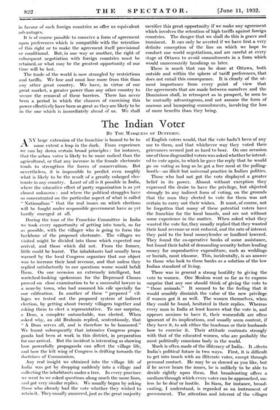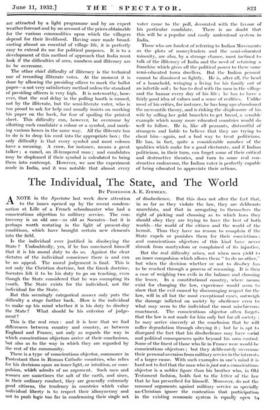The Indian Voter
By THE MARQUESS OF DUFFERIN.
A NY large extension of the franchise is bound to be to sonic extent a leap in the dark. From experience we can lay down certain broad principles : for instance, that the urban voter is likely to be more radical than the agricultural, or that any increase it-1111e female electorate tends to strengthen the forces of conservatism. But nevertheless, it is impossible to predict even roughly what is likely to be the result of a greatly enlarged elec- torate in any country. Least of all is it possible in India, where the educative effect of party organization is as yet almost unknown : and where the political struggles have so concentrated on the particular aspect of what is called "
Nationalism" that the real issues on which elections will be fought under responsible government have as yet hardly emerged at all.
During the tour of the Franchise Committee in India we took every opportunity of getting into touch, so far as possible, with the villager who is going to form the backbone of the proposed electorate. The villages we visited might be divided into those which expected our arrival, and those which did not. From the former, little could be learnt. The inhabitants had usually been warned by the local Congress organizer that our object was to increase their land revenue, and that unless they replied satisfactorily to our questions worse would befall them. On one occasion an extremely intelligent, but wretched-looking spokesman for the Depressed Classes proved on close examination to be a successful lawyer in a near-by town, who had assumed his role specially for our edification. In another of these " prepared " vil- lages we tested out the proposed system of indirect election, by getting about twenty villagers together and asking them to elect a representative. To our surprise, a Dom, a complete untouchable, was elected. When asked why, an old Brahmin replied, sententiously, that "A Dom serves all, and is therefore to be honoured." We learnt subsequently that intensive Congress propa- ganda had been at work in this district, in preparation for our arrival. But the incident is interesting as showing how powerfully propaganda can affect the village life, and how the left wing of Congress is drifting towards the doctrines of Communism.
Any real insight we obtained into the village life of India was got by dropping suddenly into a village and collecting the inhabitants under a tree. In every province we went to we asked questions along much the same lines, and got very similar replies. We usually began by asking those who already had the vote whether they wished to retain it. Theyusually answered, just as the great majority
of English voters would, that the vote hadn't been of any use to them, and that whichever way they voted their grievances seemed just as hard to bear. On one occasion one of these disgruntled voters was asked whether he intend- ed to vote again, to which he gave the reply that he would go on voting as long as he got a free meal at the polling- booth—an illicit but universal practice in Indian politics.
Those who had not got the vote displayed a greater belief in its power. Almost without exception they expressed the desire to have the privilege, but objected strongly to any indirect form of voting, on the grounds that the man they elected to vote for them was not certain to carry out their wishes. It must, of course, not be forgotten that many of these potential voters have the franchise for the local boards, and are not without some experience in the matter. When asked what they wanted the vote for, they usually replied that they wanted their land revenue or rent reduced, and the rate of interest they paid to the local moneylender or landlord lowered. They found the co-operative banks of some assistance, but found their habit of demanding security before lending money for unproductive expenditure, such as weddings or burials, most irksome. This, incidentally, is an answer to those who look to these banks as a solution of the low Indian standard of living.
There was in general a strong hostility to giving the vote to women. One Moslem went so far as to express surprise that any one should think of giving the vote to "those animals." It seemed to be the feeling that it would sensibly diminish the value of the new privilege if women got it as well. The women themselves, when they could be found, hesitated in their replies. Whereas every man in India at least knows what the vote is, and appears anxious to have it, their womenfolk are often ignorant of its implications, and usually seem content, if they have it, to ask either the headman or their husbands how to exercise it. Their attitude contrasts strongly with that of the educated women, who are probably the most politically conscious body in the world.
Much is often made of the illiteracy of India. • It affects India's political future in two ways. First, it is difficult to get into touch with an illiterate voter, except through personal contact. He may be as shrewd as you like, but if he never hears the issues, he is unlikely to be able to decide rightly upon them. But broadcasting offers a medium through which every voter can be approached, un- less he be deaf or hostile. In Siam, for instance, broad- casting, I understand, is regarded as an instrument of government. The attention and interest of the villager
are attracted by a light programme and by an expert weatherforecast and by an account of the prices obtainable for the various commodities upon which the villagers depend for their livelihood. Having once made broad- casting almost an essential of village life, it is perfectly easy to extend its use for political purposes. It is to a development of this method of approach that India must look if the difficulties of area, numbers and illiteracy are to be overcome.
The other chief difficulty of illiteracy is the technical one of recording illiterate votes. At the moment it is done by allowing the presiding officer to mark the ballot paper—allot very satisfactory method unless the standard of presiding officers is very high. It is noteworthy, how- ever, that the real delay in the polling booth is caused, not by the illiterate, but the semi-literate voter, who is too proud to ask for help and usually insists on marking his paper on the back, for fear of spoiling the printed sheet. This difficulty can, however, be overcome by allotting each candidate a colour or a symbol, and mark- ing various boxes in the same way. All the illiterate has to do is to drop his card into the appropriate box ; the only difficulty is that every symbol and most colours have a meaning. A crow, for instance, means a great talker ; a camel, an ill-tempered man ; and candidates may be displeased if their symbol is calculated to bring them into contempt, However, we saw the experiment made in India, and it was notable that almost every voter came to the poll, decorated with the favour of his particular candidate. There is no doubt that this will be a popular and easily understood system in India.
Those who are fondest of referring to Indian Movements as the plots of moneylenders and the semi-educated minority, are also, by a strange chance, most inclined to talk of the illiteracy of India and the need of retaining a franchise which gives all the political power to these same semi-educated town dwellers. But the Indian peasant cannot be dismissed so lightly. He is, after all, the head of a household, wringing a living for his family out of an infertile soil ; he has to deal with the men in the village and the bazaar every day of his life ; he has to have a fairly good idea of values and a sense of realities. Unlike most of his critics, for instance, he has long ago abandoned the mercantile theory, and is risking the displeasure of his wife by selling her gold bracelets to get bread, a sensible example which many more educated countries would do well to follow. He is, like all peasants, distrustful of strangers and liable to believe that they are trying to cheat him—again, not a bad way to treat politicians. He has, in fact, quite a considerable number of the qualities which make for a good electorate, and if Indian politicians, in their turn, can forget some of their critical and destructive theories, and turn to some real con- structive endeavour, the Indian voter is perfectly capable of being educated to appreciate their actions.



































 Previous page
Previous page